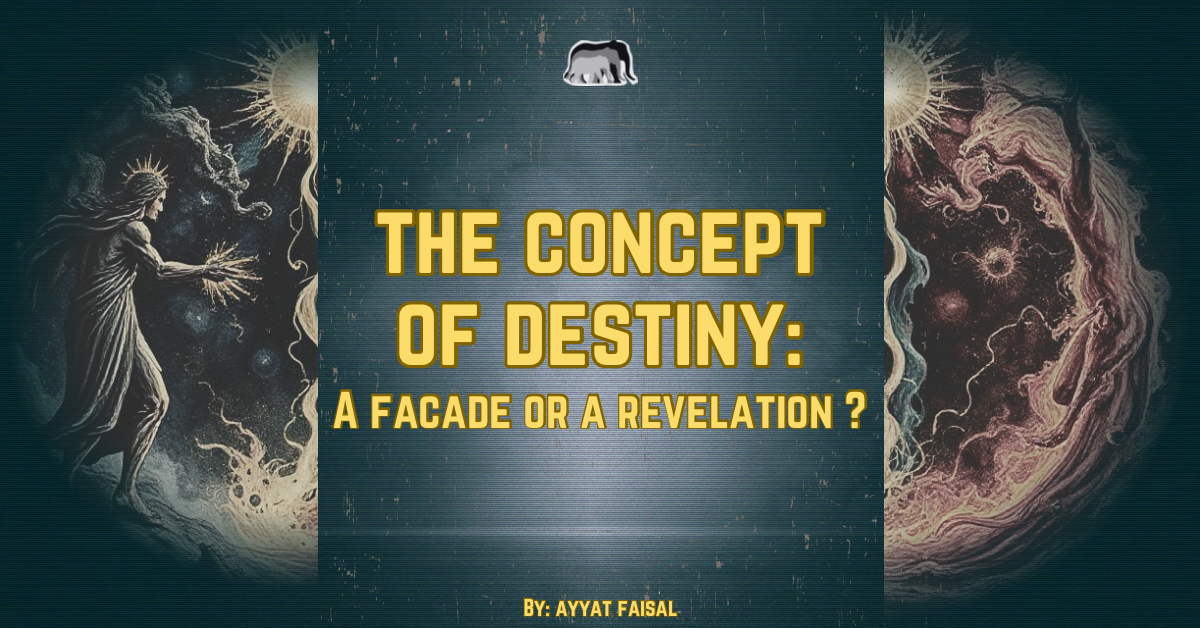Growing up in a brown family, the phrase ‘jo naseeb mai ho’ echoed through nearly every conversation, a constant reminder of fate’s inevitable grip on our lives. A newborn daughter? Naseeb. A failed marriage? Naseeb. A stillborn child? Naseeb. A successful business? Naseeb. Surprisingly, this concept isn’t confined to the brown community; it transcends cultures and knows no boundaries. Perhaps its universal reach is why no one ever thought to question it. Instead, we stood by, allowing our destiny to unfold in its own time. With destiny so firmly etched into our lives, it’s worth asking: Does fate truly control our journey, or have we allowed this belief to shape our reality? If we never question this belief, we may remain prisoners forever of a concept we barely understand. So, what really is destiny?
While one may argue that it’s yet another concept invented by man to glorify life, I believe it’s far deeper than that. Destiny, dearest reader, isn’t your ordinary human construct. It is the very concept that has mankind wrapped around its wrist, an idea that accompanies you like a shadow everyday, the unwavering answer to anything we can’t comprehend. To put it simply, I’m sure we’ve all had our fair share of “Ah yes, fate!” moments. Maybe it was something as simple as being fashionably late to college while your professor hasn’t arrived yet, or maybe something a tad bit more complex like stepping outside for a quick break, and in that moment, narrowly avoiding a tragic accident that could have changed everything. In both cases, the very first explanation that comes to mind is “destiny.”
That, however, is the belief we all preach because it’s easier, but what about the other part of the story? What about your classmate who showed up far too early and had to wait an hour for class to start? Or what about the grieving mother mourning the loss of her newborn child, bound to feel as if she’s cursed because of her bad “naseeb?” And what about the business owner who’s poured years of sleepless nights and endless devotion into his company, only to have all his hard work overshadowed by the claim that his “destiny” was the sole reason for his success, as if the sacrifices he made never truly mattered? That is the very part we all fail to acknowledge, because, to be fair, no one likes questioning paradoxical concepts. So, is destiny really your picture perfect saviour? Or is it simply a convenient label we apply when things seem beyond our control? Perhaps, if we accept destiny as our universal truth, we must also acknowledge its contradictions and complexities. The way we justify destiny may vary, but at its core, the belief remains universal.
Different philosophies interpret destiny in varying ways, but they all share a common thread: the belief that everything happens for a reason. Whether it’s predestination for a religious scholar, the burnt toast theory for an atheist, or fate for a mystic, these ideas share the same crucial element. The notion of believing in an underlying purpose isn’t the issue at stake, but rather the idea of giving up on one’s own sense of being over it. The problem is holding it up on such a high pedestal that we blindly surrender to the idea of being mere passengers in our very own life. It’s undeniable that human beings were given free will, so where exactly does destiny lie? Not far.
Free will and Destiny are simply two faces of the same coin because two things can be true at once. While certain outcomes may be our predestined fate, some endings are the consequences of our own woke conscience and decisions. Unless we realize that OUR decisions decide our destiny, and not the other way around, we are likely to find ourselves caught in an endless loop of passive acceptance, waiting for life to unfold rather than actively shaping it. It is nothing but blatant ignorance to blame your failure at one task on destiny’s dirty work. Likewise, it is a tragic irony to be so consumed by this concept that your existence feels like a curse, preventing you from living up to your true potential.
From the earliest of times, we were told not to question a belief passed down by those before us. However, it is through contemplation that we learn to expand our horizons, otherwise it is our very own perception that plays the role of a cruel manipulator. All this complication doesn’t exist because of the belief in predestination, but because of our habit to bow our heads and obey what we’re told instead of finding our own meaning to things. A little more thinking, and the everlasting debate of free will vs destiny might just come to an end, because perhaps the two aren’t so different. Maybe the reason they “can’t coexist” is simply because of how limited our comprehension of the two concepts is.
To conclude, destiny is neither a facade, nor a revelation. It is a delicate balance between the paths we choose and the circumstances that shape us. By questioning, reflecting, and embracing the power of our own decisions, we begin to see that both free will and destiny are not opposing forces but rather two sides of the same coin. When we stop blindly following and start thinking for ourselves, we might just realize that destiny isn’t something that happens to us, but something we help shape with each conscious step we take.
By Ayyat Faisal
Writer (Team 2024 – 2025)

